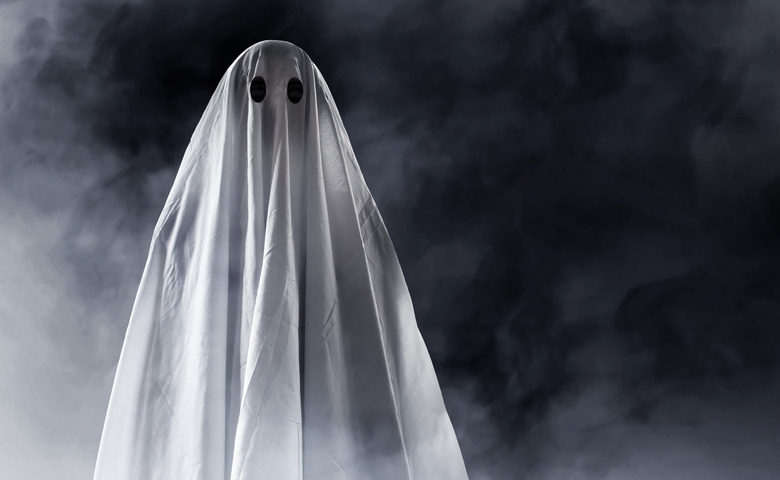This Is Probably Why You've Seen A Ghost, According To Science
Sure, it's the season of spookiness. But ghosts, goblins and ghouls don't really exist, right? It all depends who you ask!
Let's get one thing straight upfront: There's no scientific evidence discovered so far to support the idea that ghosts exist. But that doesn't stop people from believing.
Roughly 45 percent of Americans believe in ghosts, according to a 2013 Huffington Post/YouGov poll. Nearly one in five people – 18 percent – think they've seen a ghost as well, a 2009 Pew research survey uncovered. And 29 percent of the survey respondents in that same Pew survey said they'd been in touch with the dead.
So where does the belief in ghosts come from? Not surprisingly, some of of the belief in ghost comes down to cultural beliefs – like the widely-held belief that there is life after death. But other aspects of believing? It's all in your brain. Here's what could be going on.
Seeing Spirits in the Dark?
Seeing Spirits in the Dark?
One potential reason people might see a spector? A side effect of our natural stress response. During times of fear or stress – like when you're walking alone at night think you hear a footstep behind you – is heightened awareness. Your heart will start racing, and you'll start to become hyper-aware of your surroundings. That enhanced awareness might mean you detect movements or even shifts in the air – and, possibly, attribute it to a spirit.
Some evidence backs this theory up. When researchers based in the UK examined the mental states of those who reported paranormal experiences, they found that people were most likely to see ghosts (or other paranormal beings) when they're under stress. In other words, when they're more likely to be hyper-observant of their surroundings.
A Protective Shield?
A Protective Shield?
Belief in contact with the dead is even more widespread than a general belief in ghosts – and part of the reason might be our brain's natural protective mechanisms. Think about it: When you've gone through a traumatic experience, like the loss of a loved one, it's natural to desperately seek answers and comfort. And, as pattern perception expert Jennifer Whitson told the BBC, "if [the brain] can't gain control objectively, we will get it by perceiving more structures around us, even if they don't exist."
That could mean sensing the presence of your loved one to bring comfort, or taking good luck as a sign they're watching out for you. And, of course, it means being visited by your loved one in a dream is part of the normal grieving process.
An Actual Neurological Issue?
An Actual Neurological Issue?
While some supernatural phenomena might stem from natural brain processes, others could be a sign that something's wrong. Disorders affecting the parts of your brain that process vision could make you see "poltergeists" moving objects. Problems with areas of the brain involved in self-awareness could make you sense a presence close by. And, of course, anything else that messes with your perception – drugs, alcohol, sleep deprivation – could also have an effect.
The Bottom Line
The Bottom Line
When most people believe in life after death, it's probably not surprising that many people believe the dead can appear to us or contact us, too. Perceiving contact with a ghost or spirit can be a part of the normal grieving process, and can even tell you about how your brain works during a stressful situation.
Whether you really believe in ghosts or not, 'tis the season to enjoy the supernatural and scary. So grab your favorite ghost story or visit a haunted house – and let the experience give you a thrill.
References
- Psychology Today: How the God You Worship Influences the Ghosts You See
- Psychology Today: Why Some People See Ghosts and Other Presences
- BBC: Psychology: The Truth About the Paranormal
- Pew Research: 18% of Americans say they've seen a ghost
- Huffington Post: Spooky Number Of Americans Believe In Ghosts
Cite This Article
MLA
Tremblay, Sylvie. "This Is Probably Why You've Seen A Ghost, According To Science" sciencing.com, https://www.sciencing.com/this-is-probably-why-youve-seen-a-ghost-according-to-science-13715425/. 22 October 2018.
APA
Tremblay, Sylvie. (2018, October 22). This Is Probably Why You've Seen A Ghost, According To Science. sciencing.com. Retrieved from https://www.sciencing.com/this-is-probably-why-youve-seen-a-ghost-according-to-science-13715425/
Chicago
Tremblay, Sylvie. This Is Probably Why You've Seen A Ghost, According To Science last modified August 30, 2022. https://www.sciencing.com/this-is-probably-why-youve-seen-a-ghost-according-to-science-13715425/
